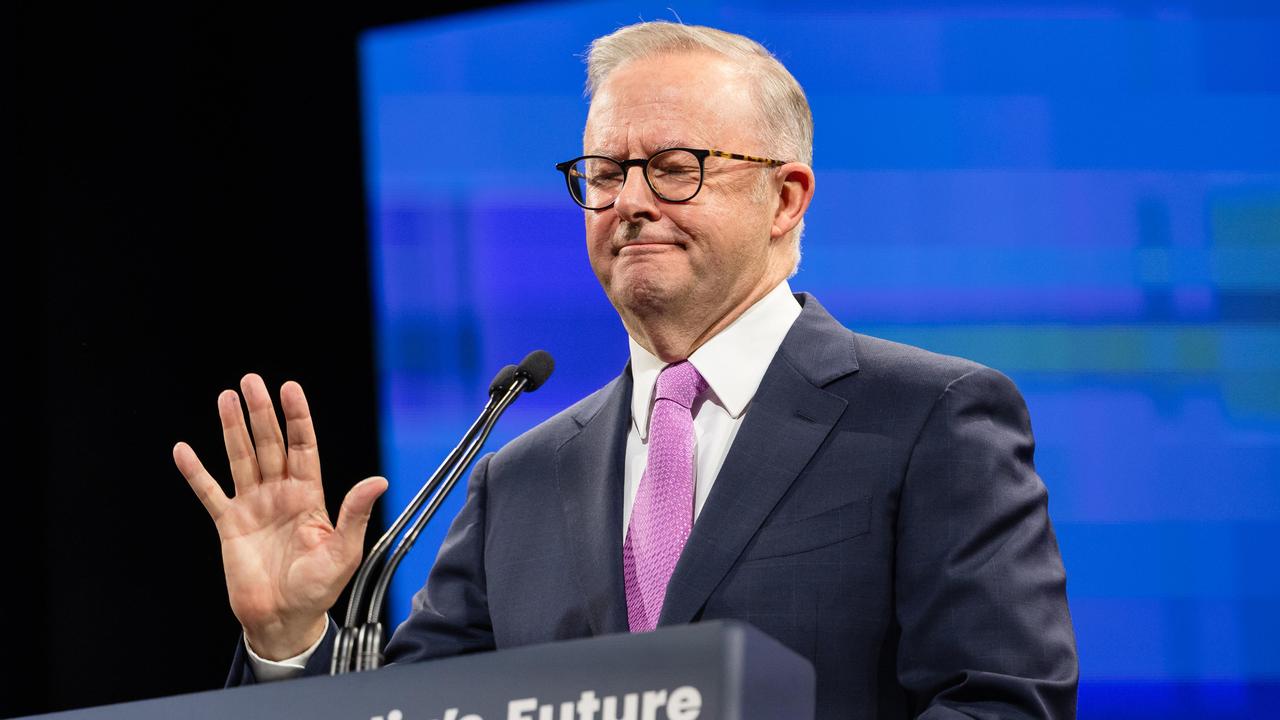James Campbell: Christianity is key to Scott Morrison so how does it affect politics?
It’s clear Christianity isn’t just something Scott Morrison practises on Sundays. So how does his faith interact with his politics?
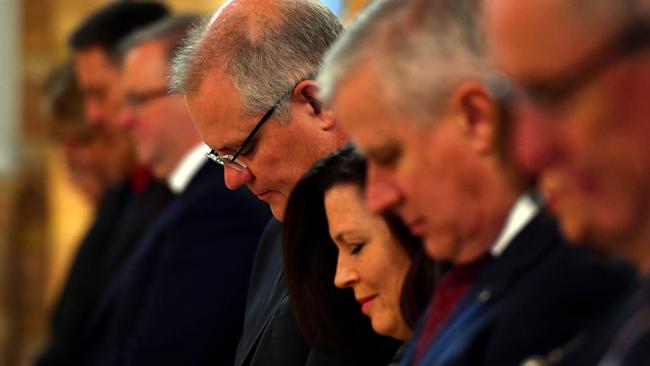
James Campbell
Don't miss out on the headlines from James Campbell. Followed categories will be added to My News.
Since he became Prime Minister two-and-half years ago Australians have become used to the idea that in the matter of his faith Scott Morrison is not one to hide a light under a bushel.
So much so that during the 2019 election he invited the media to join him on Easter Sunday as he worshipped at his Horizon church in Sydney’s Sutherland Shire.
But just how important religion is to Scott Morrison will have only become clear to some people if they took the time to watch the 23-minute video which surfaced last weekend of the PM speaking to the national conference of the Australian Christian Churches, which represent the majority of the nation’s Pentecostal churches.
Mr Morrison had flown to the Gold Coast expressly to address the ACC and as he stood at the lectern with his Bible before him, no one could be in any doubt that the Prime Minister’s religion is not just something he practises on Sunday.

Christianity, it is clear, is central to Scott Morrison’s whole life. And not just his life, but also that of his wife Jenny, who he first met at a Christian youth camp when he was 16.
Mr Morrison was raised a Presbyterian but became Pentecostal Christian as a young adult.
The Morrisons’ church, Horizon, formerly known Shirelive, is one of a growing number of Pentecostal megachurches that are the fastest growing strand of Christianity in Australia.
In 2006, there were 220,000 Pentecostals in Australia according to ABS, a number which had grown to 260,500 by 2016.
Other estimates have put the numbers much higher, with some scholars arguing that taken together with other charismatic churches Pentecostals in 2016 actually numbered 870,000 people or 3.7 per cent of the Australian population.
How Mr Morrison’s faith interacts with his politics is less clear.
He is famously on record as saying the Bible is “not a policy handbook”.
And though he abstained in the vote against same-sex marriage, he has put plans to legislate to protect religious freedoms in the bottom drawer, a place where most political observers expect they will stay.
“Faith is very much an ingrained part of my life and I just seek His wisdom in the same way you do each and every day and it’s important we do that,” he told the conference as he quoted a number of verses from the Bible that he has reflected on.
One, taken from the Old Testament book of Chronicles also suggests that for the Prime Minister, religion is not just a matter for the individual but should be at the heart of the nation.
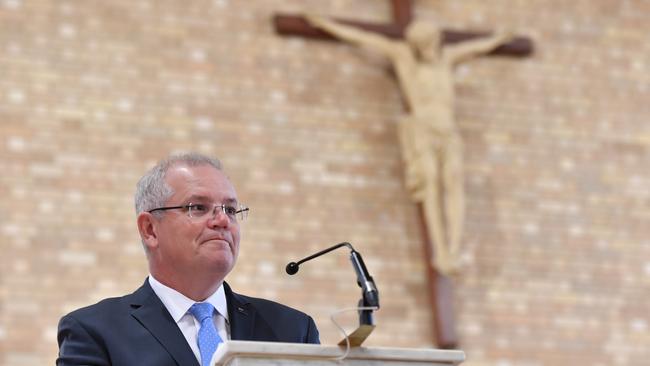
The verse tells of the reign of King Saul in which the Children of Israel did not inquire of the Lord.
“(W) e know that over the course of Israel’s history that those who didn’t inquire of the Lord, those who neglected the Lord, those who put what the Lord had put in their heart to one side, then their kingdoms went where they went and the people followed them where they went, and we all remember what happened when that occurred and this is a constant reminder to me just in my own personal walk,” he said.
Media reports of the speech zeroed in on the Prime Minister’s reference to the Devil – or the Evil One as he called him — as though he is a real presence active in the world.
But according to sociologist of religion Andrew Singleton of Deakin University, to the audience he was addressing this view of the Devil is mainstream.
“Pentecostals believe the Devil is a real character who actively confounds the lives of believers and the more faithful you are the more likely the devil is going to wage spiritual war against you,” he said.
The Constitution of the Australian Christian Churches is explicit: “We believe in the personality of the devil, who, by his influence, brought about the downfall of man, and now seeks to destroy the faith of every believer in the Lord Jesus Christ”.
So what is Pentecostalism? Where did it come from? And how does it differ from other forms of Protestant Christianity, even other forms of Evangelism?
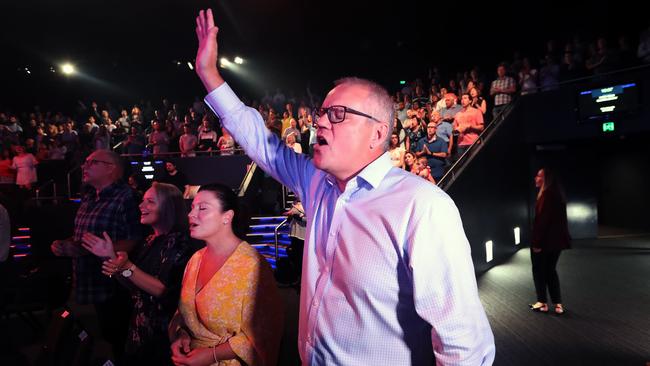
Pentecostalism as we know it today began in the US in the first decade of last century. The first congregation in Australia, the Good News Hall, was founded in Melbourne in 1908.
Like many early Pentecostal churches, according to Dr Mark Jennings who teaches Religious Studies at Murdoch University, it was led by women
“One of the first key differences between Pentecostals and Evangelicals certainly back then and that continues in many cases today is that Pentecostals in the early days of the Australian movement really had a lot of women in leadership whereas Evangelicals typically have not,” he said.
“Before 1930 most of the Pentecostal churches in Australia had been started by women and were being led by women.”
Pentecostalism, as the name implies, comes from the Feast of Pentecost, the occasion described in the Acts of the Apostles in which a mighty wind filled the house where the followers of Jesus were gathered and divided tongues as of fire appeared and rested on each of them.
The Apostles were all filled with the Holy Spirit and began to speak in other languages.
They also performed other miracles such as healing the sick.
Historically the majority of Protestant denominations, such as the Presbyterian faith that Mr Morrison was raised in, have adhered to the doctrine of “cessationism” which is the belief that the age of miracles was confined to these days of the early Church.
The Pentecostals explicitly reject the idea the age of miracles has passed.
As the ACC’s constitution makes clear, they “believe in the present day operation of the nine supernatural gifts of the Holy Spirit” as recorded in the Book of Corinthians.

This list, which in addition to Faith is made of up the Word of Knowledge (which relates to the understanding of scripture) and the Word of Wisdom which relates to divine messages granted to an individual, the supernatural gifts include Prophecy, Healings, Miracles, the Discerning of Spirits, Different Kinds of Tongues, and the Interpretation of Tongues.
The last two refer to what is called glossolalia – the trancelike state in which the speaker begins to speak in unknown languages — and ability to understand what the speakers are saying.
Dr Jennings said when the modern Pentecostal movement was born in the first decade of the last century, the practice of speaking-in-tongues was viewed with suspicion by other Christians.
“A lot of the Evangelicals in the early days of the Pentecostal movement really thought, well, either they’re deluded or they’re possessed by the devil but either way we want nothing to do with it so the Pentecostals had to leave the churches they had been part of,” he said.
But from the 1960s onwards with the rise of what came to be called the charismatic movement across the Western world people in other Christian churches also started speaking-in-tongues.
What distinguishes the Pentecostals from these other churches however is the importance they place on it.
This tied up in another doctrine Dr Jennings said is distinctive to Pentecostalism – Baptism in the Holy Spirit.
Baptism in the Holy Spirit – unlike baptism in water which incidentally is an adults-only experience in Pentecostalism – “is the bestowing of the believer with power to be an effective witness for Christ” according to the ACC and is an experience “distinct from, and subsequent to, the new birth; is received by faith, and is accompanied by the manifestation of speaking in tongues as the Spirit gives utterance, as the initial evidence.”
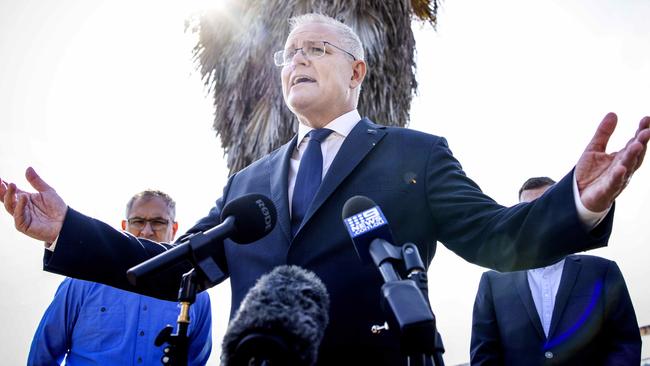
So while many Protestant denominations believe believers are ‘born again’ Pentecostals believe they also undergo a second baptism in the Holy Spirit and “initial evidence” of this is glossolalia.
“One of the things Evangelicals would dispute is that there is this subsequent experience — so the idea that you can be saved and accept Jesus as your saviour and that means you’re saved from hell but there is a further experience of sanctifying power.
“Charismatics would say ‘well look I have this experience’ – they would regard it as a gift they certainly wouldn’t regard it as central and they wouldn’t regard it as something everybody has to have,” said Dr Jennings.
Dr Singleton said that Pentecostals were more likely to think that God involved himself in all aspects of a believer’s life.
“All Christians believe that God is actively engaged with believers and nonbelievers alike’ but they have much sharper experience and expression of that so they believe God gets intimately involved in every aspect of a believer’s life’ from small decisions to major financial decision to planning a family so God’s intimately involved and they want God to be involved,” he said.
Mr Morrison famously said that his win in 2019 was a miracle. What most people may not have realised is that as a Pentecostal, he is likely to believe that God gives visible signs of his favour in this world
According to Dr Jennings for Pentecostals “if things go well it’s because it’s because God is showing favour to us but if things go badly perhaps we were asking for the wrong things or maybe there is maybe there is some major sin that we haven’t discovered yet.”




